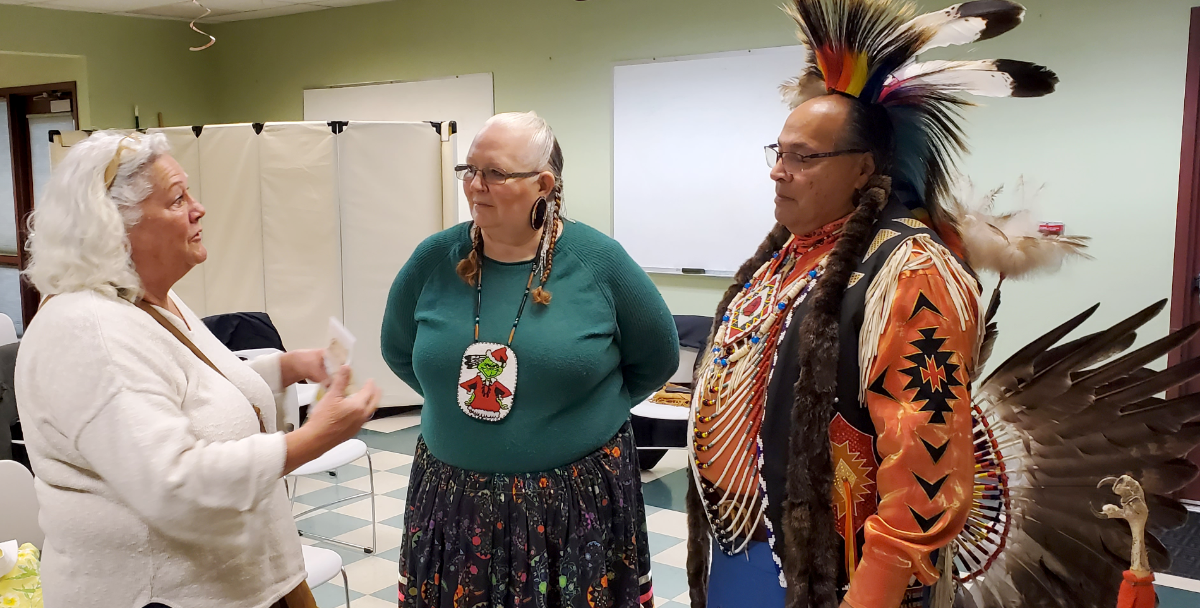
“What you said here today will stay with me forever.”
– Heartfelt Sentiment from a Participant at Fern Ridge Library
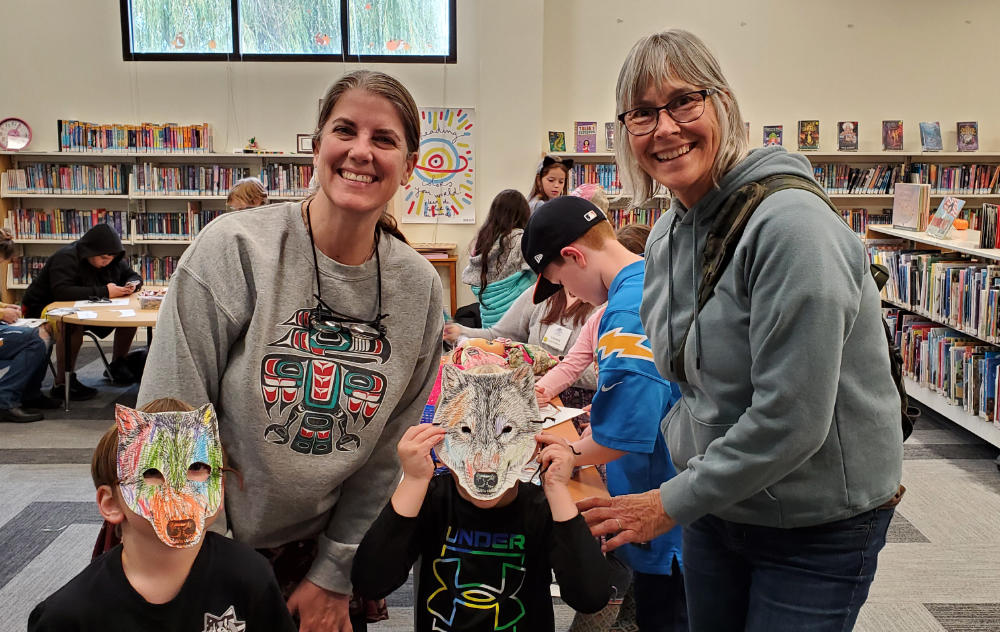
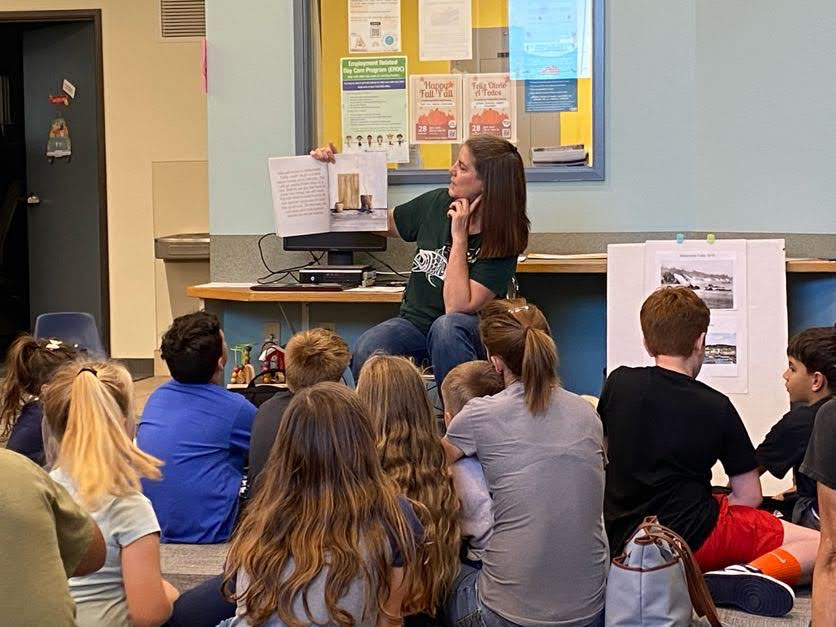
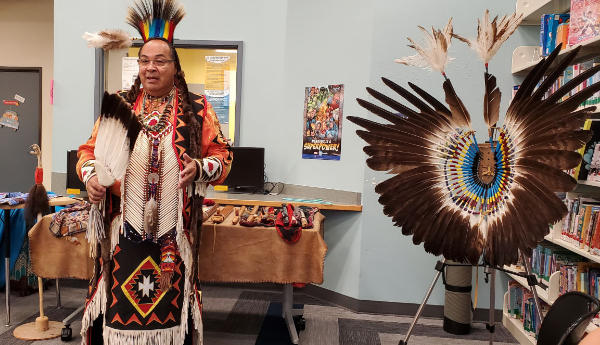
Deitrich Peters in regalia, photo by Karen Rainsong.
Deitrich Peters Bio
“I was born in Dallas, Oregon and I’m a member of the Confederated Tribes of Grand Ronde. I am Kalapuya, Rouge River, and Umpqua. My given name is Cosa Tance, meaning “Sky Dancer”. My English name is Deitrich David Peters. I was given both my grandfather’s middle names. I grew up in Oregon and love to travel to as many cultural events as I can.
I love my culture and traditions – making things with my hands, working with feathers, beadwork, traditional dancing, storytelling and of course my all time favorite, flute playing. I have learned these many things from our elders, and have been gifted these things by the Creator.”
Deitrich Peters
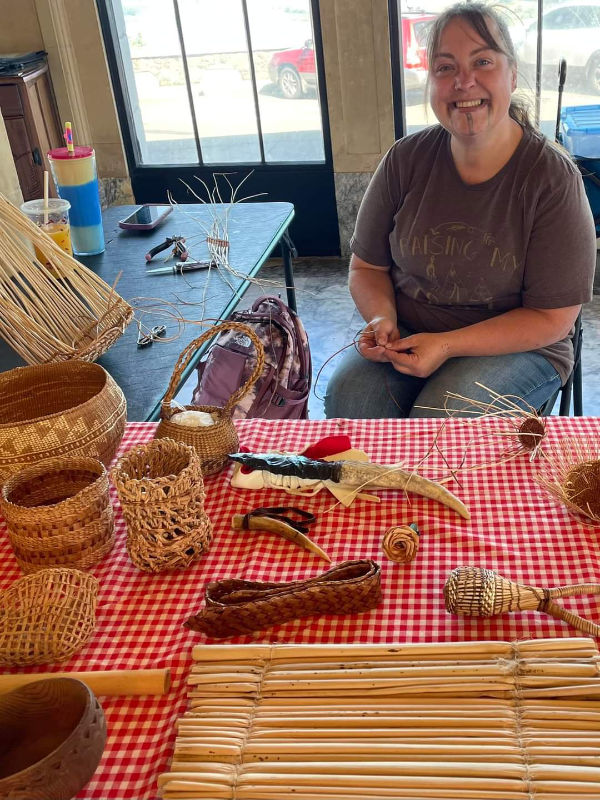

Stephanie Craig Bio
Her traditional name translates to old soul young eyes, and her American name is Stephanie Craig. She’s a 7th generation traditional basket weaver, traditional ecological knowledge (TEK) and lifeways practitioner, culture keeper and bearer. She’s an anthropologist with a focus on western Oregon cultural archaeology, cultural museum collections management consultant and educator. Her MA:IS is in Anthropology, Indigenous Museums and Folklore. She uses TEK methods, indigenous ways of knowing, ancestral knowledge, traditional plants to create, revive and awaken centuries old art and ways of life, like within basketry.
Tribal History/Shared History Assessment 2022
In 2017, the Oregon state legislature enacted the Tribal History/Shared History initiative and directed the Oregon Department of Education’s Office of Indian Education (ODE/OIE) to develop a K–12 Native American curriculum for all Oregon public schools. Since 2017, more than 45 lesson plans have been developed for grades four, eight, and ten across multiple content areas. During the 2020/21 academic year, ODE/OIE launched the first phase of implementation in these grade levels. According to the Tribal History/Shared History status assessment in 2022, for non-mandated grades (1st – 3rd), 66% of Educators said they were aware of Tribal History/Shared History. Only 26% of educators said they understood the concepts well enough to teach them. Only 36% of educators in Oregon said they feel moderately or well supported in teaching this curriculum. Curriculum directors expressed that those educators who know about the initiative show interest in implementing—as one participant put it, teachers are “begging for it. We want this, we want this historical knowledge…” Curriculum developed by the Confederated Tribes of Grand Ronde for K – 2 grades has been under-utilized in Oregon as shown by the assessment.
Our Acorn Circle program reaches children and also teachers. With the added special event of a Grand Ronde Tribal member speaker to share regalia, storytelling and music, as well as answer questions, this series bridges the gap between the creation and delivery of the Tribal History/Shared History curriculum in these communities.
Acorn Circle Program: Indigenous Education in Libraries
See the KEZI TV news broadcast about this program.
2025 Dates/times TBD
Overview
The Acorn Circle program brings Native American culture and children’s education to libraries in the Lane County area. We partner with local libraries to provide this educational program free to the public. Each library receives three sessions for children including story time and a craft project, utilizing curriculum from the Confederated Tribes of Grand Ronde. At the conclusion of the sessions, we host a Native American culture-bearer in a free public event that can include storytelling, music, and traditional handcrafts.
Our Executive Director, Karen Rainsong, though not Native herself, is connected with the Indigenous (Kalapuya) community locally. She regularly teaches at and participates in the Native American Cultural Encampments that happen during the summer in Linn County, with Deitrich Peters and his extended family and community. Karen brings the Kalapuya Ways presentation items, as well as atlatls, cordage making, storytelling and children’s crafts to these public events. SCEC also has been providing Kalapuya Ways presentations since 2007 to local communities. Karen comes to this work from a place of respect, humility, listening and cooperation. Read more here.
Curriculum
The curriculum includes story books published by the Confederated Tribes of Grand Ronde (CTGR), discussion and activities, and a related craft. Trained SCEC staff lead these sessions for children aged 6 – 10 and provide the supplies and instruction. Books include “Let’s Go Eeling”, “Mulak Man” and “Coyote and the Fish Trap.” This program has been approved by Cheyanne Heidt, the Curriculum Specialist for the Confed. Tribes of Grand Ronde. SEE MORE HERE.
Financial Support From:
Spirit Mountain Community Fund, Three Rivers Foundation, The Woodard Family Foundation, the City of Cottage Grove and participating libraries
And support from local businesses:
MECCA Materials Exchange Center in Eugene
Dirt Cheap Copies in Cottage Grove
Teachers are Welcome
We invite teachers to attend this program, to get ideas for how to bring these lessons into the classroom for younger ages. Teachers do not need to RSVP for this program. Please see the sidebar to learn more about the Tribal History/Shared History teaching assessment that was done in 2022, showing the need for this support.
Cultural Presentation
The cultural presentations with either Deitrich Peters or Stephanie Craig of the Grand Ronde Tribe at each library coincide with Native American Heritage month in November. Deitrich (Deitz) shares elements of his regalia, plays flute music, tells personal stories and takes questions. Stephanie is a Kalapuya basket maker and weaver and brings traditional materials and techniques as well as personal stories to share. SCEC Executive Director Karen Rainsong brings items of Kalapuya material culture. All are welcome at these free and family-friendly events.
Testimonials
“It is difficult to find accurate, culturally appropriate resources about our local Indigenous tribes. The Acorn Circle programs did exactly that in a fun, participatory way that kids and families could enjoy while learning. The programs tied together well, and kids looked forward to what they were going to do next time. The books that were donated to our library collection added much needed information about the customs and practices of local native peoples.”
LuCinda Gustavson
Associate Manager, Springfield Public Library
“This program provided kids with unique opportunities to engage with Indigenous culture through a historical lens as well as focusing on elements of the present day. We loved how the fun activities and crafts pulled the story together. Overall, it was a great experience for everyone involved.”
Lindsey Quigley-Johnson
Youth Librarian, Creswell Public Library
Dates and Times 2025
Cottage Grove Library
Coming Soon!
Eugene Library
Coming Soon!
Springfield Library
Coming soon!
Fern Ridge Library
Coming soon!

Deitrich Peters in regalia, photo by Karen Rainsong.
Deitrich Peters Bio
“I was born in Dallas, Oregon and I’m a member of the Confederated Tribes of Grand Ronde. I am Kalapuya, Rouge River, and Umpqua. My given name is Cosa Tance, meaning “Sky Dancer”. My English name is Deitrich David Peters. I was given both my grandfather’s middle names. I grew up in Oregon and love to travel to as many cultural events as I can.
I love my culture and traditions – making things with my hands, working with feathers, beadwork, traditional dancing, storytelling and of course my all time favorite, flute playing. I have learned these many things from our elders, and have been gifted these things by the Creator.”
Deitrich Peters

Stephanie Craig Bio
Her traditional name translates to old soul young eyes, and her American name is Stephanie Craig. She’s a 7th generation traditional basket weaver, traditional ecological knowledge (TEK) and lifeways practitioner, culture keeper and bearer. She’s an anthropologist with a focus on western Oregon cultural archaeology, cultural museum collections management consultant and educator. Her MA:IS is in Anthropology, Indigenous Museums and Folklore. She uses TEK methods, indigenous ways of knowing, ancestral knowledge, traditional plants to create, revive and awaken centuries old art and ways of life, like within basketry.
Tribal History/Shared History Assessment 2022
In 2017, the Oregon state legislature enacted the Tribal History/Shared History initiative and directed the Oregon Department of Education’s Office of Indian Education (ODE/OIE) to develop a K–12 Native American curriculum for all Oregon public schools. Since 2017, more than 45 lesson plans have been developed for grades four, eight, and ten across multiple content areas. During the 2020/21 academic year, ODE/OIE launched the first phase of implementation in these grade levels. According to the Tribal History/Shared History status assessment in 2022, for non-mandated grades (1st – 3rd), 66% of Educators said they were aware of Tribal History/Shared History. Only 26% of educators said they understood the concepts well enough to teach them. Only 36% of educators in Oregon said they feel moderately or well supported in teaching this curriculum. Curriculum directors expressed that those educators who know about the initiative show interest in implementing—as one participant put it, teachers are “begging for it. We want this, we want this historical knowledge…” Curriculum developed by the Confederated Tribes of Grand Ronde for K – 2 grades has been under-utilized in Oregon as shown by the assessment.
Our Acorn Circle program reaches children and also teachers. With the added special event of a Grand Ronde Tribal member speaker to share regalia, storytelling and music, as well as answer questions, this series bridges the gap between the creation and delivery of the Tribal History/Shared History curriculum in these communities.

